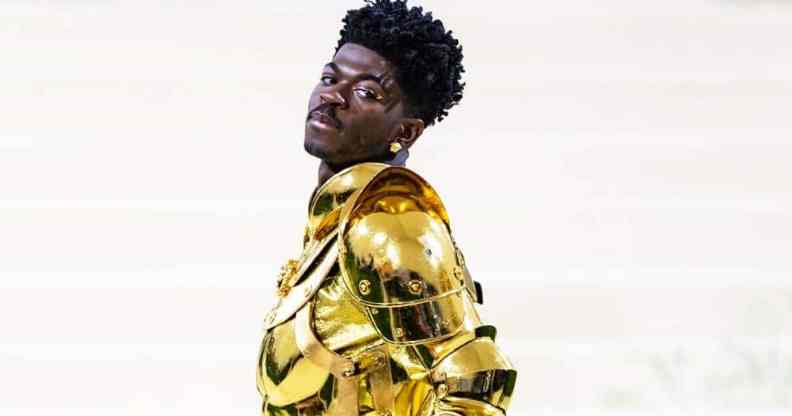Lil Nas X ‘fought internally and cried every day’ while making ‘therapeutic’ Montero

Lil Nas X attends the Met Gala at the Metropolitan Museum of Art on 13 September 2021 in New York City. (Getty/Gilbert Carrasquillo/GC Images)
Lil Nas X said that making Montero, his breathtaking and critically acclaimed debut studio album, allowed him to “begin healing”.
The rapper, 22, has over the last few months solidified his place as one of modern music’s most bold culture shape-shifters by lap-dancing Satan, sparring against Christian homophobes and being the ultimate power bottom.
After months of anticipation, and the singer, known off-stage as Montero Lamar Hill, dropped his first album rammed with bottoming bangers that pulls from pop, trap and rock.
But for now, a sense of relief for Lil Nas X, who reflected on the personal journey – and emotional toll – making Montero had on him.
Lil Nas X ‘faced his skeletons’ to make Montero. And we are blessed for it
“I love joking, but on a serious note, making this album was therapy for me,” the Grammy Award-winning singer tweeted Saturday (18 September).
i love joking but on a serious note making this album was therapy for me. i began healing many unchecked wounds, facing skeltons in my closet i never wanted to, fighting internally every day and crying persistently, MONTERO is truly my baby. thanks for the love ??
— MONTERO ? (@LilNasX) September 18, 2021
“I began healing many unchecked wounds, facing skeletons in my closet I never wanted to, fighting internally every day and crying persistently.
“Montero is truly my baby. Thanks for the love.”
With the album already topping the streaming charts, Lil Nas X’s success seems worlds away from where he was only years ago.
In an intimate interview with Zane Lowe on Apple Music 1, the “Industry Baby” megastar opened up about the difficulties in making music as an openly gay artist.
At the beginning of his career, he said, his anxiety seized him on a daily basis. “The entire time I was making music,” he said, “I thought soon I was going to die for some reason.”
The death of his grandmother shook him, he reflected, as she was the “first person that was close to me that I had ever lost”.
Lil Nas X added that “Old Town Road”‘s abrupt and roaring success, as welcome as it was, actually exacerbated his anxiety further.
“I was like: ‘Oh, I’m definitely dying soon’,” he said. “All of these artists that were coming into, or starting to pop into the music industry were passing away, I was like: ‘What the f**k is happening?'”
Living his truth as a gay man was a challenge in and of itself, he added. “I feel like we still haven’t reached a place where I can do something right now that no straight person has done that’s considered too far,” he said.
“Because then, it’s really too far because no straight person has done it yet.”

